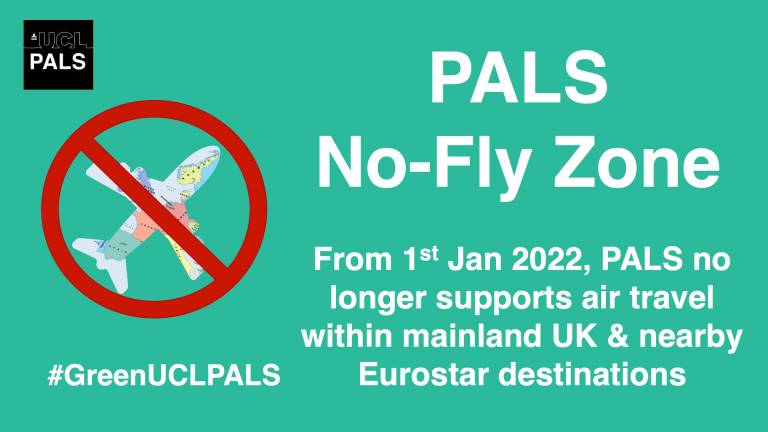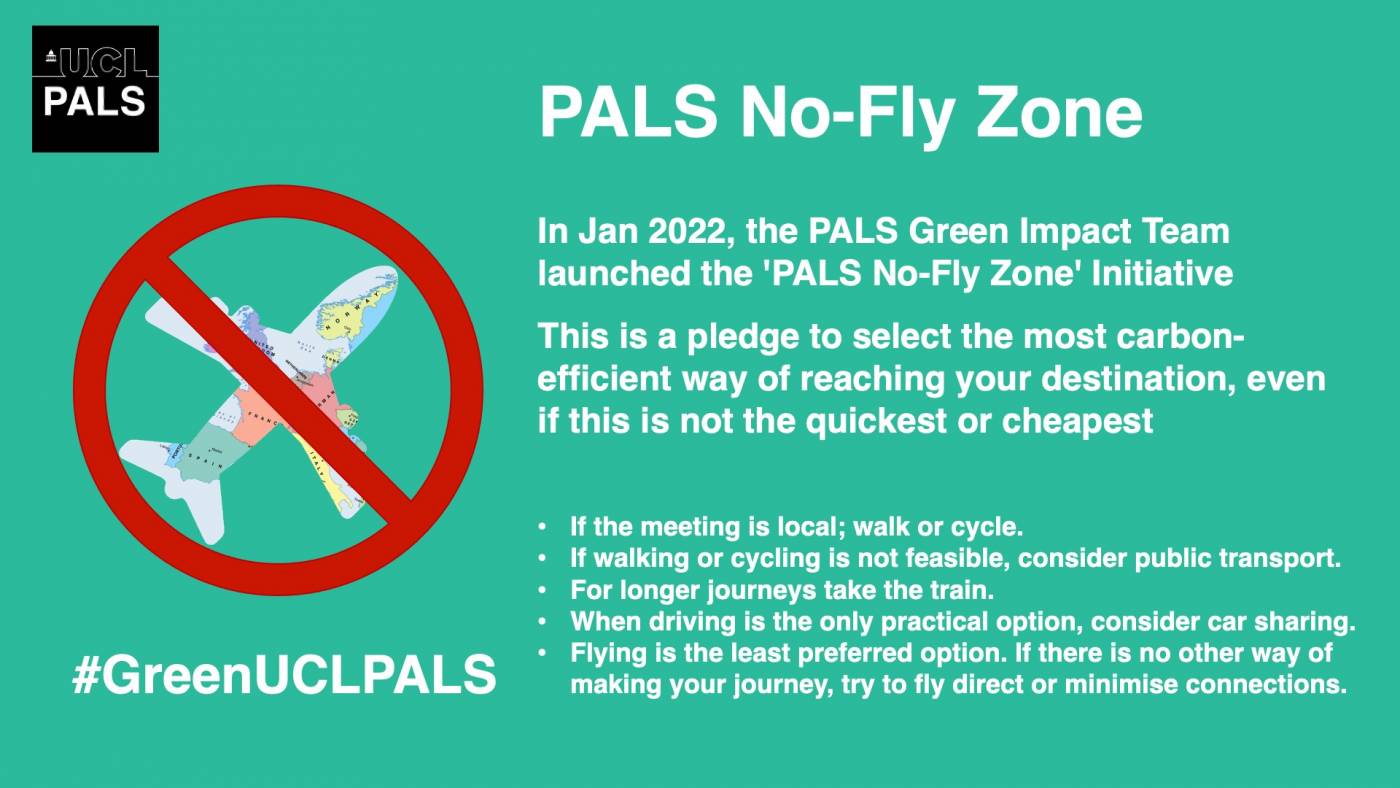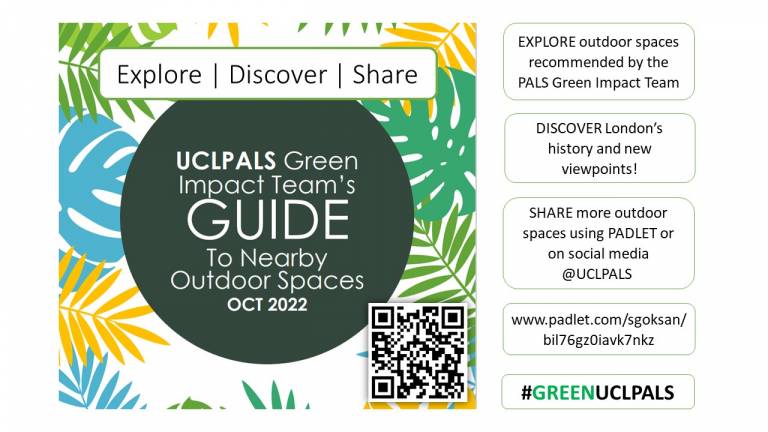We are thrilled to announce that from 1st January 2022, PALS launched the 'PALS No-Fly Zone' initiative - where we no longer support air travel within mainland UK and Eurostar destinations (Paris, Brussels, Amsterdam)

From 1st January 2022, PALS will no longer fund academic air travel within mainland UK or nearby Eurostar destinations. Rather all travel must be by rail or other sustainable means. This applies to travel funded by PALS for its staff and students as well as visitors.
According to a recent BBC article, around 2.4% of global CO2 emissions come from aviation. Together with other gases and the water vapour trails produced by aircraft, the industry is responsible for around 5% of global warming. "The climate effect of non-CO2 emissions from aviation is much greater than the equivalent from other modes of transport, as these non-CO2 greenhouse gases formed at higher altitudes persist for longer than at the surface and also have a stronger warming potential," Eloise Marais, from the Atmospheric Composition Group, at the University of Leicester, told BBC News.
Professor Peter Fonagy (Head of UCL PALS) supports the initiative: "The 'PALS No-Fly Zone', as with many of the other initiatives of our award-winning Green Impact Team, helps UCL move towards our shared ambition of a Net Zero Higher Education - a greener model of teaching, learning, scholarship and research that minimises environmental impact but also delivers increased accessibility." We are keen that all of our staff and students select the most carbon-efficient way of reaching their destination, even if this may not necessarily be the quickest or cheapest option.
Professor Mark Maslin, Professor of Earth System Science at UCL who has expertise in global and regional climatic change and has published over 175 papers in journals, comments: "UCL is one of the world's leading universities when it comes to both research and action on climate change. But we can always do better. PALS No-Fly Zone is leading the way by funding academic rail travel instead of high carbon emission air travel within mainland UK or nearby European destinations. This policy should be adopted by the whole of UCL as it will make a considerable difference to the carbon footprint of academics while encouraging networking and engagement with mainland UK and European colleagues."
John Draper (Head of UCL PALS Administration) adds: “The PALS No-Fly Zone is a great initiative as air travel has such a high carbon impact. I am proud that PALS have made this important first step and hope others can follow our lead”.
Dr Matthew Winning, Senior Research Fellow at the UCL Institute for Sustainable Resources, says: "Flying is absolutely one of the most important issues academia needs to tackle to play its role in solving the climate crisis. The PALS No-Fly Zone is such an important initiative and should be the standard for UCL policy in general. The onus should not be on individual academics to reduce personal emissions but happen through institutional level change and new norms. PALS is doing just that!"
When learning about the 'PALS No-Fly Zone', Hannah Knox, UCL Professor of Anthropology, said: "The PALS No-Fly Zone is a great example of how institutions can support the move to a zero carbon society. Air-travel is still a significant part of UCL's carbon footprint. The PALS no-fly zone offers a clear commitment to move towards a fossil free academia and I hope that other departments and universities will follow PALS lead."
Anna Vassova (President of the UCL Behavioural Innovations Society) adds the following: "Last year one of our Applied Projects Team had the opportunity to work with PALS on the research and planning phase of this project and we couldn’t be more excited to see the PALS No-Fly Zone pledge launch! The UCL Behavioural Innovations Society fully supports the initiative, and we hope to see its positive effect on people’s behaviour to help reduce carbon footprint. Starting big or small, all our behaviours matter and can contribute to this vision of a better future."
Professor Wendy Best, UCL Professor of Communication Science and Language Therapy, reflects further on the initiative with the following: "Saving time or saving humanity? Are we gaining time for ourselves by flying or time for our planet by travelling by train? Think twice, think green travel."
In addition to air travel finance, we are pledging to take the following steps and encourage others to do the same:
- Walk or cycle if the meeting is local.
- If walking or cycling is not feasible, consider public transport.
- For longer journeys take the train.
- When driving is the only practical option, consider sharing a car.
- Flying is the least preferred option. If there is no other way of making your journey, try to fly direct or minimise connections.
To find out more about the UCL PALS Green Impact initiatives, and to get involved, visit our PALS Green Awareness webpage at: ucl.ac.uk/pals/pals-green-awareness
- The 'PALS No-Fly Zone' Initiative is mentioned in the January 2022 Staff newsletter "The Week@UCL".
- The 'PALS No-Fly Zone' Initiative is mentioned in the 'Sustainable UCL' 2022 Climate Action webpage (in the 'What action is UCL taking on travel?' section).
- See some of our actions on social media via the #GreenUCLPALS hashtag.
- PALS Green Awareness webpage.
- Read the "Friends of the Earth" Policy on Aviation and climate change.
- BBC news article on "Climate change: Should you fly, drive or take the train?"
- BBC article on "Should we give up flying for the sake of the climate?"
- EcoWatch article on "To Fly or Not to Fly? The Environmental Cost of Air Travel"
- Our World in Data article on "Climate change and flying: what share of global CO2 emissions come from aviation?"

Timeline of others joining our efforts
- 15 February 2022: The UCL Queen Square Institute of Neurology (IoN) Executive Committee endorsed a new pledge for the Institute, which is the implementation of an IoN No-Fly Zone policy.
- 28 April 2022: UCL Division of Psychiatry sign up to the No-Fly Zone policy.
 Close
Close


 Check out the Green Impact Team's
Check out the Green Impact Team's 